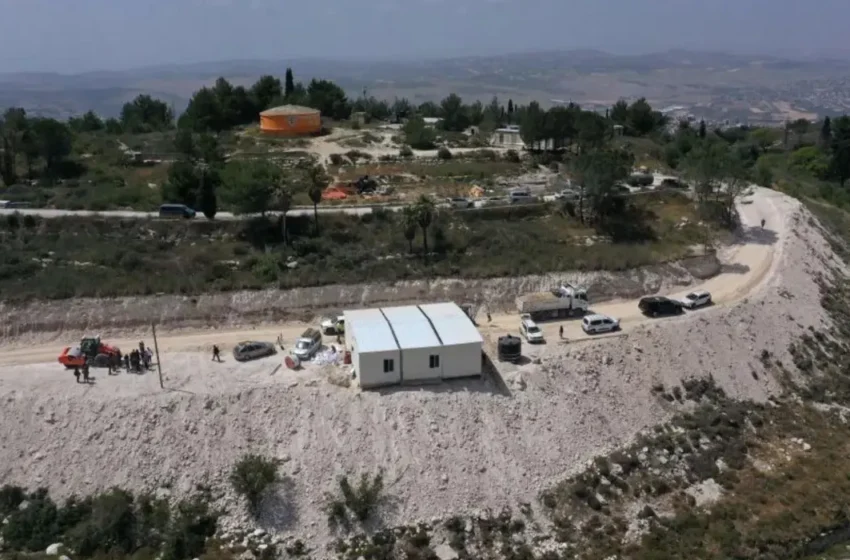
Israel ( Europe Brief News): Israel approves 22 new settlements in the occupied West Bank, marking the largest expansion in decades, prompting concerns over de facto annexation.
NGOs and human rights organizations claim that Israel is annexing the region in an open manner.
In the occupied West Bank, 22 additional Jewish colonies have been authorized by the Israeli government. Many of them are existing outposts that were constructed without official permission. Now they will be legalized.
Members of Prime Minister Benjamin Netanyahu’s war cabinet shared a map of the 22 sites on X and Telegram. The West Bank has seen the biggest settlement growth in decades.
According to the government, it is “a one-time decision.”
Two ultra-conservative members of Netanyahu’s war cabinet, Israel Katz, the minister of defense, and Bezalel Yoel Smotrich, the minister of finance, will spearhead the effort.
Katz says the decision “strengthens our grip on Judea and Samaria,” the biblical term for the West Bank.
“It enshrines our historic right to the Land of Israel and is a devastating response to Palestinian terrorism. It is a strategic move that prevents the creation of a Palestinian state that would endanger Israel.”
“We are not taking foreign territory, but the legacy of our ancestors,”
Smotrich explains.
The West Bank has been under Israeli occupation since 1967. Approximately 700,000 Jewish settlers now reside in 160 villages that have been constructed since then. Israel wants to increase its power there. The villages range in size from tiny outposts on hills to completely constructed communities complete with public parks, commercial centers, factories, and residential buildings.
Israel maintains military control over the roughly 3 million Palestinians who reside in the West Bank. Mahmoud Abbas’s Palestinian Authority has little administrative power over the region.
Even prior to the October 7, 2023, Hamas attack and the outbreak of the war in Gaza, settlement expansion has surged in recent years.
The likelihood of a successful independent state is diminished if the Palestinian population is compelled to dwell on ever-tinier portions of the West Bank.
The top court in the United Nations, the International Court of Justice, said last year that Israel’s existence in the occupied Palestinian territories is illegal.
The judge mandated that settlement building cease immediately. Israel disputed the court’s decision, claiming the areas belong to the Jewish people’s ancestral homeland.
Mahmoud Abbas’ office referred to Israel’s approval of new settlements as a “dangerous escalation” and charged that the government was still entangling the area in a “cycle of violence and instability.”
“This extremist Israeli government is trying by all means to prevent the establishment of an independent Palestinian state,”
spokesman Nabil Abu Rudeineh told Reuters. He urged the U.S. government to intervene.
Since the start of the conflict in Gaza, Israel has been de facto annexing the West Bank, according to NGOs and human rights groups opposed to the settlements.
“The Israeli government is no longer pretending: the annexation of the occupied territories and the expansion of settlements is its central goal,”
says the Israeli NGO Peace Now.
“This move will profoundly change the West Bank and further entrench the occupation.”
“At a time when both the Israeli public and the international community are calling for an immediate end to the war, the government is making it clear – once again and without hesitation – that it prefers the intensification of the occupation and the continuation of de facto annexation over the pursuit of peace.”
How might Israel’s settlement expansion impact future peace negotiations?
It becomes more challenging to create a cohesive, independent Palestinian state based on the 1967 borders as a result of the expansion, which divides the West Bank into remote pockets. Palestinian sovereignty and self-determination, which are essential conditions for peace, are at danger due to this territorial fragmentation.
The expansion of settlements is denounced by numerous nations and international organizations as unlawful under international law, including resolutions of the UN Security Council. This damages the goodwill and confidence needed for talks and could further isolate Israel diplomatically.
Increased hostilities, violence, and confrontations between Israeli security forces, Palestinians, and settlers are frequently the results of settlements. Peace negotiations are made more difficult by this atmosphere of insecurity, which also hardens sentiments on both sides.


